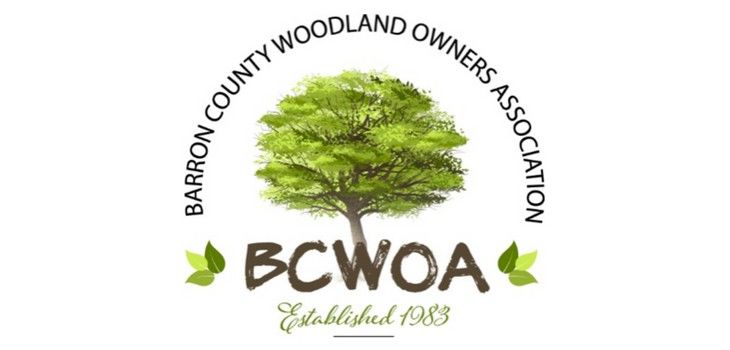A portion of the veneer produced at Birchwood Manufacturing in downtown Rice Lake is sold for skateboard manufacturing, said Wayne Brock, Vice president for veneer production at Besse Forest Products group, which owns the facility. “It’s steady business. The average life of a skateboard in California is only 27 days,” he noted.
Brock, together with Plant Manager Al Madson and Director of Standing Timber Joe Rademacher, hosted the Barron County Woodland Owners Association on a special members-only tour of the plant on May 9. Wearing ear and eye protection, about 30 woodland owners were led in groups through the production line, from raw logs at the start to veneer cut and stacked ready for shipping at the end.
Logs are first conditioned in steam baths for two to four days, depending on species and diameter, Brock said. Logs are then debarked, washed, inspected and cut to length, hand-planed, and finally put into the lathe, where veneer is peeled off the log like paper off a roll. To ensure a smooth cut with the fewest splits, “the logs are at 80 to 65 percent moisture at that point,” said Brock. After the veneer has been cut into four by eight foot pieces, it’s put through a dryer, coming out at 10 to 14 percent moisture.
The plant’s 80 employees and three lathe lines turn out veneer in 16 grades, utilizing all species of available hardwoods, said Brock. Besides standard sizes and thicknesses, the plant also produces custom veneer for specialty markets such as gunstocks, musical instruments, wooden propellers, and archery.
Though Birchwood is the newest veneer plant in North America, it sits on one of Rice Lake’s most historic sites, said BCWOA past President Ed Forrester. “This property was part of the Knapp-Stout mill built in the 1860s, so we’ve got a history of 140 years here, of using a renewable resource.”
Besse acquired the mill in 1996; then in 1999 it burnt, said Rademacher. “We rebuilt, and re-opened in 2001.”
Forrester said that “Besse did us a big favor by rebuilding. If they hadn’t, the jobs wouldn’t be here and we wouldn’t have this place to sell our wood to.”
Depending on demand and the season, anywhere from 12 to 20 logging crews at a time will be subcontracting to Besse, Rademacher said, working with state and county forests as well as private landowners. “In this area red oak is 40 to 60 percent of what we purchase. We buy all grades of logs from number three sawlogs up to veneer quality. We’re always looking for quality hardwoods.”
Even the best-quality stands typically yield only around 10 to 15 percent veneer logs, said Rademacher, “10 to 30 inches in diameter, sound on both ends, and no seams.” Other logs are sent to one of family-owned Besse’s nine other facilities, including Mattoon, Ladysmith, and Goodman in Wisconsin; and Baraga and Gladstone in Michigan, where the company also has its headquarters.
“The more you manage your woods properly, the more your trees evolve from just a pulp stick to the kind of valuable wood they use here,” Forrester said. “Growing better timber puts a lot more money in your pocket.”
For more information about Besse Forest Products Group or timber sales, visit their web site at www.bessegroup.com, or contact Joe Rademacher at 906-280-4109 or JRademacher@bessegroup.com. For more information about the Barron County Woodland Owners Association, contact President Steve Hansen at 715-288-6817 or shansena@centurytel.net.
Last Update: May 14, 2018 11:01 am CDT

















